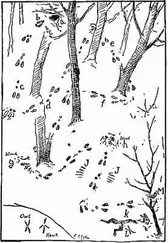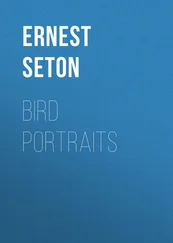Ernest Seton - Rolf in the Woods
Здесь есть возможность читать онлайн «Ernest Seton - Rolf in the Woods» весь текст электронной книги совершенно бесплатно (целиком полную версию без сокращений). В некоторых случаях можно слушать аудио, скачать через торрент в формате fb2 и присутствует краткое содержание. Год выпуска: 1997, Жанр: Приключения про индейцев, Исторические приключения, на английском языке. Описание произведения, (предисловие) а так же отзывы посетителей доступны на портале библиотеки ЛибКат.
- Название:Rolf in the Woods
- Автор:
- Жанр:
- Год:1997
- ISBN:нет данных
- Рейтинг книги:3 / 5. Голосов: 1
-
Избранное:Добавить в избранное
- Отзывы:
-
Ваша оценка:
- 60
- 1
- 2
- 3
- 4
- 5
Rolf in the Woods: краткое содержание, описание и аннотация
Предлагаем к чтению аннотацию, описание, краткое содержание или предисловие (зависит от того, что написал сам автор книги «Rolf in the Woods»). Если вы не нашли необходимую информацию о книге — напишите в комментариях, мы постараемся отыскать её.
Rolf in the Woods — читать онлайн бесплатно полную книгу (весь текст) целиком
Ниже представлен текст книги, разбитый по страницам. Система сохранения места последней прочитанной страницы, позволяет с удобством читать онлайн бесплатно книгу «Rolf in the Woods», без необходимости каждый раз заново искать на чём Вы остановились. Поставьте закладку, и сможете в любой момент перейти на страницу, на которой закончили чтение.
Интервал:
Закладка:
After the meal was finished and the Indian had smoked, they set to work. In a few loads each, the stuff was portaged across, and the canoe was carried over and moored to the bank.
The cargo replaced, they went on again, but in half an hour after passing more shoal water, saw another rapid, not steep, but too shallow to float the canoe, even with both men wading. Here Quonab made what the Frenchmen call a demi-charge. He carried half the stuff to the bank; then, wading, one at each end, they hauled the canoe up the portage and reloaded her above. Another strip of good going was succeeded by a long stretch of very swift water that was two or three feet deep and between shores that were densely grown with alders. The Indian landed, cut two light, strong poles, and now, one at the bow, the other at the stern, they worked their way foot by foot up the fierce current until safely on the upper level.
Yet one more style of canoe propulsion was forced on them. They came to a long stretch of smooth, deep, very swift water, almost a rapid-one of the kind that is a joy when you are coming down stream. It differed from the last in having shores that were not alder-hidden, but open gravel banks. Now did Quonab take a long, strong line from his war sack. One end he fastened, not to the bow, but to the forward part of the canoe, the other to a buckskin band which he put across his breast. Then, with Rolf in the stern to steer and the Indian hauling on the bank, the canoe was safely "tracked" up the "strong waters."
Thus they fought their way up the hard river, day after day, making sometimes only five miles after twelve hours' toilsome travel. Rapids, shoals, portages, strong waters, abounded, and before they had covered the fifty miles to the forks of Jesup's River, they knew right well why the region was so little entered.
It made a hardened canoe man of Rolf, and when, on the evening of the fifth day, they saw a huge eagle's nest in a dead pine tree that stood on the edge of a long swamp, both felt they had reached their own country, and were glad.
Chapter 18.
Animal Life Along the River
It must not be supposed that, because it has been duly mentioned, they saw no wild life along the river. The silent canoe man has the best of opportunities. There were plenty of deer tracks about the first camp, and that morning, as they turned up the Hudson, Rolf saw his first deer. They had rounded a point in rather swift water when Quonab gave two taps on the gunwale, the usual sign, "Look out," and pointed to the shore. There, fifty yards away on bank, gazing at them, was a deer. Stock still he stood like a red statue, for he was yet in the red coat. With three or four strong strokes, Quonab gave a long and mighty forward spurt; then reached for his gun. But the deer's white flag went up. It turned and bounded away, the white flag the last thing to disappear. Rolf sat spellbound. It was so sudden; so easy; it soon melted into the woods again. He trembled after it was gone.
Many a time in the evening they saw muskrats in the eddies, and once they glimpsed a black, shiny something like a monstrous leech rolling up and down as it travelled in the stream. Quonab whispered, "Otter," and made ready his gun, but it dived and showed itself no more. At one of the camps they were awakened by an extraordinary tattoo in the middle of the night—a harsh rattle close by their heads; and they got up to find that a porcupine was rattling his teeth on the frying-pan in an effort to increase the amount of salt that he could taste on it. Skookum, tied to a tree, was vainly protesting against the intrusion and volunteered to make a public example of the invader. The campers did not finally get rid of the spiny one till all their kitchen stuff was hung beyond his reach.
Once they heard the sharp, short bark of a fox, and twice or thrice the soft, sweet, moaning call of the gray wolf out to hunt. Wild fowl abounded, and their diet was varied by the ducks that one or other of the hunters secured at nearly every camp.
On the second day they saw three deer, and on the third morning Quonab loaded his gun with buckshot, to be ready, then sallied forth at dawn. Rolf was following, but the Indian shook his head, then said: "Don't make fire for half an hour."
In twenty minutes Rolf heard the gun, then later the Indian returned with a haunch of venison, and when they left that camp they stopped a mile up the river to add the rest of the venison to their cargo. Seven other deer were seen, but no more killed; yet Rolf was burning to try his hand as a hunter. Many other opportunities he had, and improved some of them. On one wood portage he, or rather Skookum, put up a number of ruffed grouse. These perched in the trees above their heads and the travellers stopped. While the dog held their attention Rolf with blunt arrows knocked over five that proved most acceptable as food. But his thoughts were now on deer, and his ambition was to go out alone and return with a load of venison.
Another and more thrilling experience followed quickly. Rounding a bend in the early dawn they sighted a black bear and two cubs rambling along the gravelly bank and stopping now and then to eat something that turned out to be crayfish.
Quonab had not seen a bear since childhood, when he and his father hunted along the hardwood ridges back of Myanos, and now he was excited. He stopped paddling, warned Rolf to do the same, and let the canoe drift backward until out of sight; then made for the land. Quickly tying up the canoe he took his gun and Rolf his hunting arrows, and, holding Skookum in a leash, they dashed into the woods. Then, keeping out of sight, they ran as fast and as silently as possible in the direction of the bears. Of course, the wind was toward the hunters, or they never could have got so near. Now they were opposite the family group and needed only a chance for a fair shot. Sneaking forward with the utmost caution, they were surely within twenty-five yards, but still the bushes screened the crab-eaters. As the hunters sneaked, the old bear stopped and sniffed suspiciously; the wind changed, she got an unmistakable whiff; then gave a loud warning "Koff! Koff! Koff! Koff!" and ran as fast as she could. The hunters knowing they were discovered rushed out, yelling as loudly as possible, in hopes of making the bears tree. The old bear ran like a horse with Skookum yapping bravely in her rear. The young ones, left behind, lost sight of her, and, utterly bewildered by the noise, made for a tree conveniently near and scrambled up into the branches. "Now," Rolf thought, judging by certain tales he had heard, "that old bear will come back and there will be a fight."
"Is she coming back?" he asked nervously.
The Indian laughed. "No, she is running yet. Black bear always a coward; they never fight when they can run away."
The little ones up the tree were, of course, at the mercy of the hunters, and in this case it was not a broken straw they depended on, but an ample salvation. "We don't need the meat and can't carry it with us; let's leave them," said Rolf, but added, "Will they find their mother?"
"Yes, bime-by; they come down and squall all over woods. She will hang round half a mile away and by night all will be together."
Their first bear hunt was over. Not a shot fired, not a bear wounded, not a mile travelled, and not an hour lost. And yet it seemed much more full of interesting thrills than did any one of the many stirring bear hunts that Rolf and Quonab shared together in the days that were to come.
Chapter 19.
The Footprint on the Shore
Jesup's River was a tranquil stream that came from a region of swamps, and would have been easy canoeing but for the fallen trees. Some of these had been cut years ago, showing that the old trapper had used this route. Once they were unpleasantly surprised by seeing a fresh chopping on the bank, but their mourning was changed into joy when they found it was beaver-work.
Читать дальшеИнтервал:
Закладка:
Похожие книги на «Rolf in the Woods»
Представляем Вашему вниманию похожие книги на «Rolf in the Woods» списком для выбора. Мы отобрали схожую по названию и смыслу литературу в надежде предоставить читателям больше вариантов отыскать новые, интересные, ещё непрочитанные произведения.
Обсуждение, отзывы о книге «Rolf in the Woods» и просто собственные мнения читателей. Оставьте ваши комментарии, напишите, что Вы думаете о произведении, его смысле или главных героях. Укажите что конкретно понравилось, а что нет, и почему Вы так считаете.




